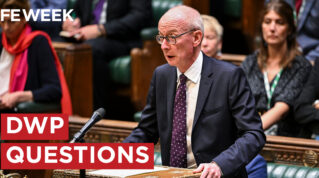Calls for the government to include post-16 providers in its teacher workforce planning have been rejected.
MPs on the House of Commons education select committee told the Department for Education earlier this year that further education was the “worst impacted” sector for teacher recruitment challenges.
It recommended the department’s teacher workforce model (TWM), which sets annual recruitment targets for schools based on pupil forecasts, should include post-16 training providers and FE colleges.
School pupil numbers are forecast to fall by 400,000 over the next four years while the number of 16- to 18-year-old learners is set to rise by 118,000.
The committee urged the DfE to include post-16 education in its modelling to ensure it has a more “holistic picture” of staffing needs “throughout all stages of education”.
But DfE rejected the committee’s recommendation in its response to the inquiry, published today.
While it “estimates demand for the further education workforce”, the department will not expand the TWM because of the “differing factors” that affect demand and supply of teachers in FE compared to schools.
These estimates are not published.
Among those differing factors are FE’s population of adult learners, the range of different provider types and the “part-time nature” of many teaching roles.
The school workforce, on the other hand, is more easily determined from the established school workforce census, the number of teachers qualifying through initial teacher training, and “a curriculum which is focused upon GCSE and A-level subjects.”
The TWM feeds into the department’s annual teacher training targets for school teachers, though the target has only been achieved once since 2015-16.
Low pay is widely understood to be the main cause of FE’s staffing crisis, with one in four staff leaving within their first year and almost half leaving after three years, according to the Institute for Fiscal Studies.
DfE’s response to the committee inquiry offered no new solutions to FE’s staffing challenges.
It repeated its commitment for this year and next to the targeted retention incentives. These are payments of up to £6,000 for teachers of maths, physics, chemistry, computing, digital, construction, early years, engineering and manufacturing who are in their first five years.
However, teachers in independent training providers are not eligible for the incentive payments.
DfE also plugged its teacher mentoring programme, which comes to an end this March, and its teacher training bursaries for priority subjects, for which applications have now closed.















Your thoughts